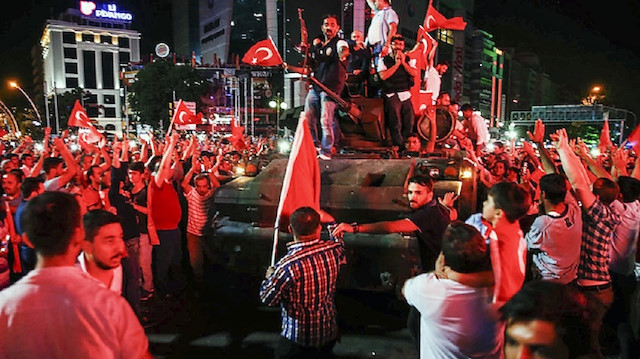
Coup attempt affected Turkey-EU relations, damaged EU's image as declared champion of democracy, rule of law, human rights
It seems that the European Union (EU) has issues in reconciling its rhetoric with its actions. After its failure to take a just moral and ethical stance for democracy and oppose the coup d’état against the first democratically elected president in Egypt in 2013, the July 15, 2016, coup attempt in Turkey was yet another litmus test for the EU to stand by its declared principles. Alas, it failed once more.
Such inconsistency, which amounts to hypocrisy in the eyes of some, affected not only the relations with Turkey but also dented the EU's reputation as a promoter of democracy and human rights around the globe, especially when one considers the Union's founding principles, which are based on the promotion and protection of human rights, democracy and the rule of law.
July 15, 2019, marks the third anniversary of the coup attempt in Turkey. On that day, a subversive and clandestine organization, known as FETO [Fetullah Gulen Terrorist Organization], which is notorious for infiltrating Turkish state institutions, such as the army, the judiciary, the police, as well as the bureaucracy, tried to overthrow the democratically elected government in Turkey.
During this coup attempt, FETO military members attacked some of the nodes of power in Turkey, such as the parliament and other public institutions, as well as the HQ of the Special Forces and the intelligence agency. Tanks and air jets under the control of the putschists opened fire on the people indiscriminately. Miraculously, however, the coup attempt was thwarted thanks to the determined stance of the Turkish people, who showed determination, resistance and courage against the coup plotters. As a result of this resistance, 246 Turkish citizens lost their lives, and around 2,000 people were injured. While this was a heavy toll, it also sent a message to the entire world that the resolution of the Turkish people would prevail against any attempt to undermine Turkey's democracy.
On the other hand, in spite of the high threat against democracy and the elected government of their ally, Western nations, especially the EU member states, did not show adequate support to Turkey. The EU member states reacted in three ways: The vast majority of them adopted a wait-and-see policy and preferred to remain silent until the outcome of the coup attempt became apparent. On the other hand, some EU countries supported, tacitly or otherwise, the coup plotters, while the remaining governments chose to be indifferent and ignored the event altogether.
The defeat of the coup had the effect of a cold shower on the EU's leadership: Neither the EU officials nor the leaders of the EU member states paid a solidarity visit to Turkey. The condemnation of the attempted coup and reiteration of its full support for Turkey by the European Council came only three days later.
To add salt to injury, the EU lacked tact and consideration. In addition to its meek and cold reaction, the EU was not interested in the trauma of the Turkish people nor in the assault directed at democratic institutions; it preferred to focus on the actions and measures that were taken after the coup, calling for leniency for the coup plotters.
An additional subject that constituted a wedge between Turkey and the EU was the political asylum that was offered to the coup members. Despite Turkey's multiple calls for support, Europe has unfortunately become a safe haven for many FETO members. The European Asylum Agency (EASO), headquartered in Malta, reported that after the attempted coup in July 2016, 51,225 FETO members requested asylum in EU countries. A report prepared by the Agency noted that 6,500 FETO members registered asylum applications with Greek authorities, and stressed that they were the largest group aside from Syrians, Afghans and Iraqis to apply for such provision.
The July 15 coup attempt has not only affected Turkey-EU relations but also damaged the EU's image as a declared champion of democracy, the rule of law and human rights. In the eyes of many, the EU's actions and attitudes on the July 15 coup attempt have severely dented the Union's credibility and put in question its political, ethical, and moral leadership. If the EU wants to increase its influence on the global stage and be taken more seriously, the Union needs to walk the talk when it matters most, follow through with promises and obligations, and show commitment to the values it prophesies.
By Enes Guzel
The writer is a deputy researcher at the TRT World Research Centre and his current research focuses on the rise of the extreme right in Europe and Islamophobia.
Hello, the comments you share on our site are a valuable resource for other users. Please respect other users and different opinions. Do not use rude, offensive, derogatory, or discriminatory language.
The floor is all yours.








